National ID Registration Progress in September 2024
89.55 percent are registered in Agusan del Sur
The Provincial Statistical Office (PSO) of Agusan del Sur reports the progress in its ongoing National ID registration campaign, with a total of 662,093 Agusanons or 89.55 percent registered as of September 30, 2024.
Leading the number of registrations is the City of Bayugan, with 98,703 registrants, followed by Prosperidad with 78,916 and San Francisco with 70,654. These high numbers were attributed to the larger populations in these areas and well-organized local registration campaigns. Even in smaller municipalities such as Santa Josefa and La Paz, robust efforts led to impressive registration counts of 23,325 and 27,716, respectively. (Figure 1)
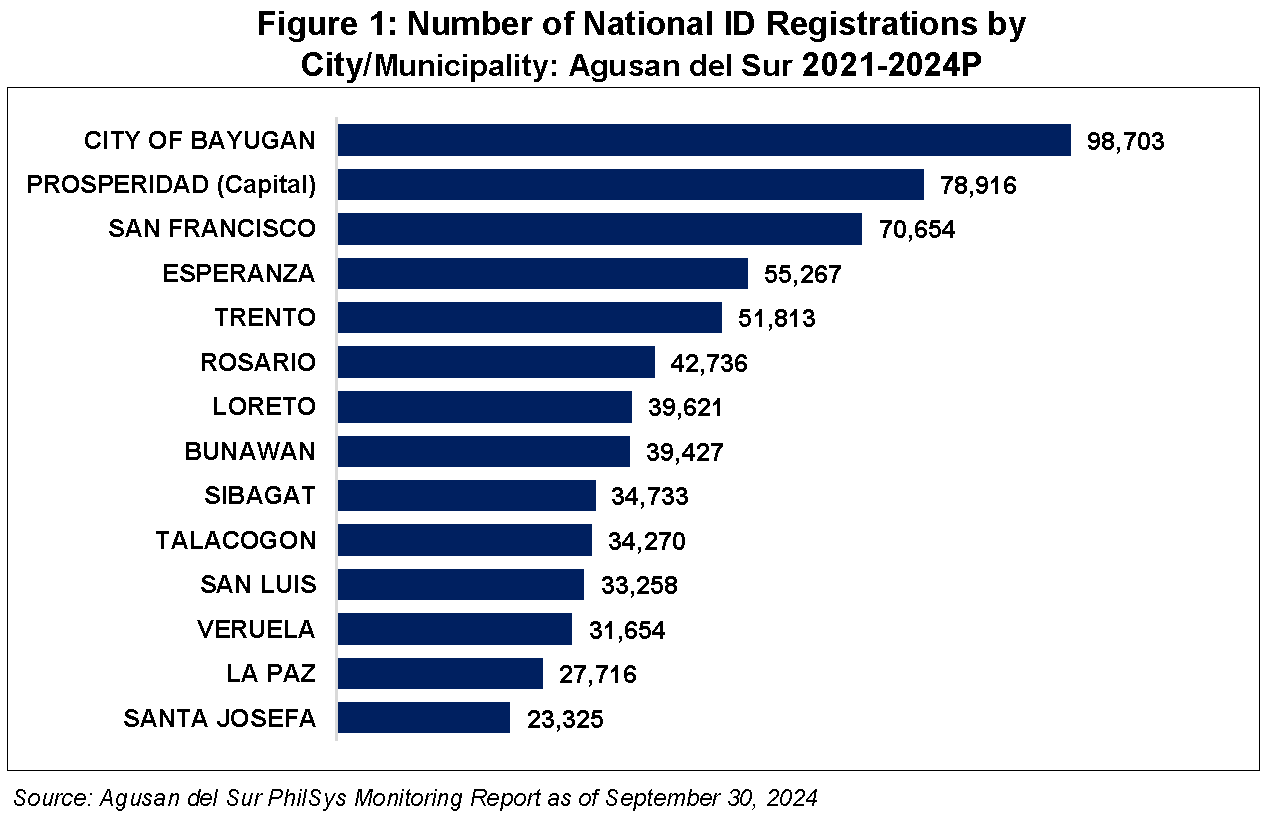
More than 78,000 estimated unregistered individuals
Bayugan City has the highest number of unregistered individuals, with over 10,000 residents still unregistered, despite achieving a registration coverage rate of 90.14 percent. The large population in this urban center presents challenges in reaching full registration, requiring sustained efforts to engage the remaining individuals. Similar challenges are observed in San Francisco and Prosperidad, with over 10,000 and 9,000 unregistered residents, respectively, despite nearing 90 percent coverage. In contrast, Veruela has the lowest registration coverage rate in the province at 79.72 percent, leaving 8,054 individuals unregistered. This rural municipality may face accessibility challenges that hinder the registration process, making it essential to introduce more focused outreach initiatives. Smaller municipalities like Sibagat, Trento, and San Luis have demonstrated strong performance in their registration efforts. Sibagat has even surpassed its target, with a registration rate of 102.29 percent, while Trento and San Luis boosted rates of 95.08 percent and 94.49 percent, respectively. (Table 1)
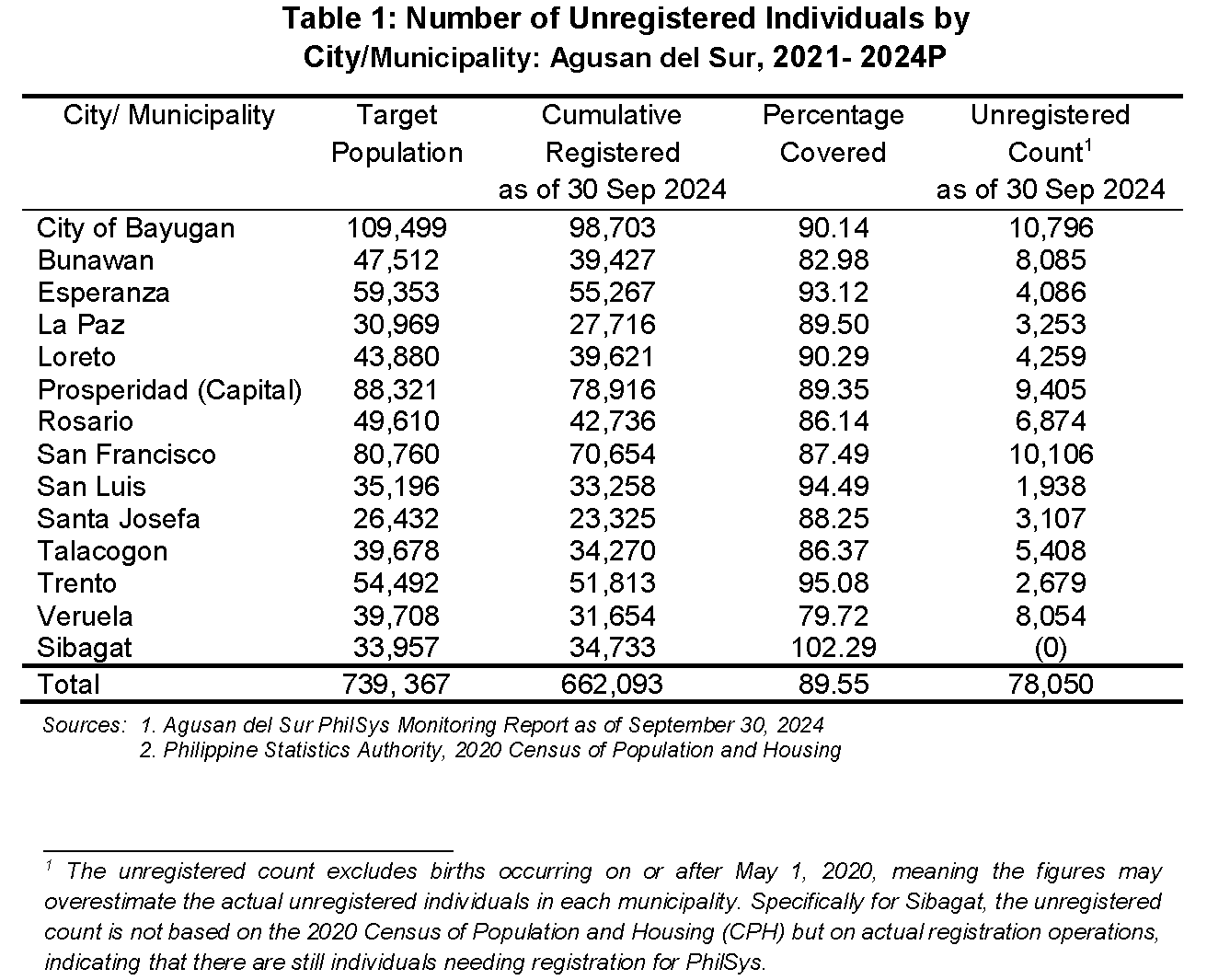
More than 18,000 or 19.21 percent of the total population of children aged one to four, have been registered
The success of the registrations may be attributed to the extensive outreach efforts, which included mobile registration aimed at remote and hard-to-reach areas. However, registration for children under five years old remains a challenge, with only 18,299 registered—just 19.21 percent of the target age group. Key barriers include dependence on parents or guardians for documentation, logistical difficulties in isolated communities, and lower awareness of the process. To address these issues, PSO will intensify mobile registration initiatives, conduct of “Rehistro Bulilit” campaign, and strengthen partnerships with local government units (LGUs), Department of Social Welfare and Development (DSWD) and educational institutions. These strategies aim to boost registration rates, particularly for young children, and ensure inclusivity for all Agusanons. (Figure 2)
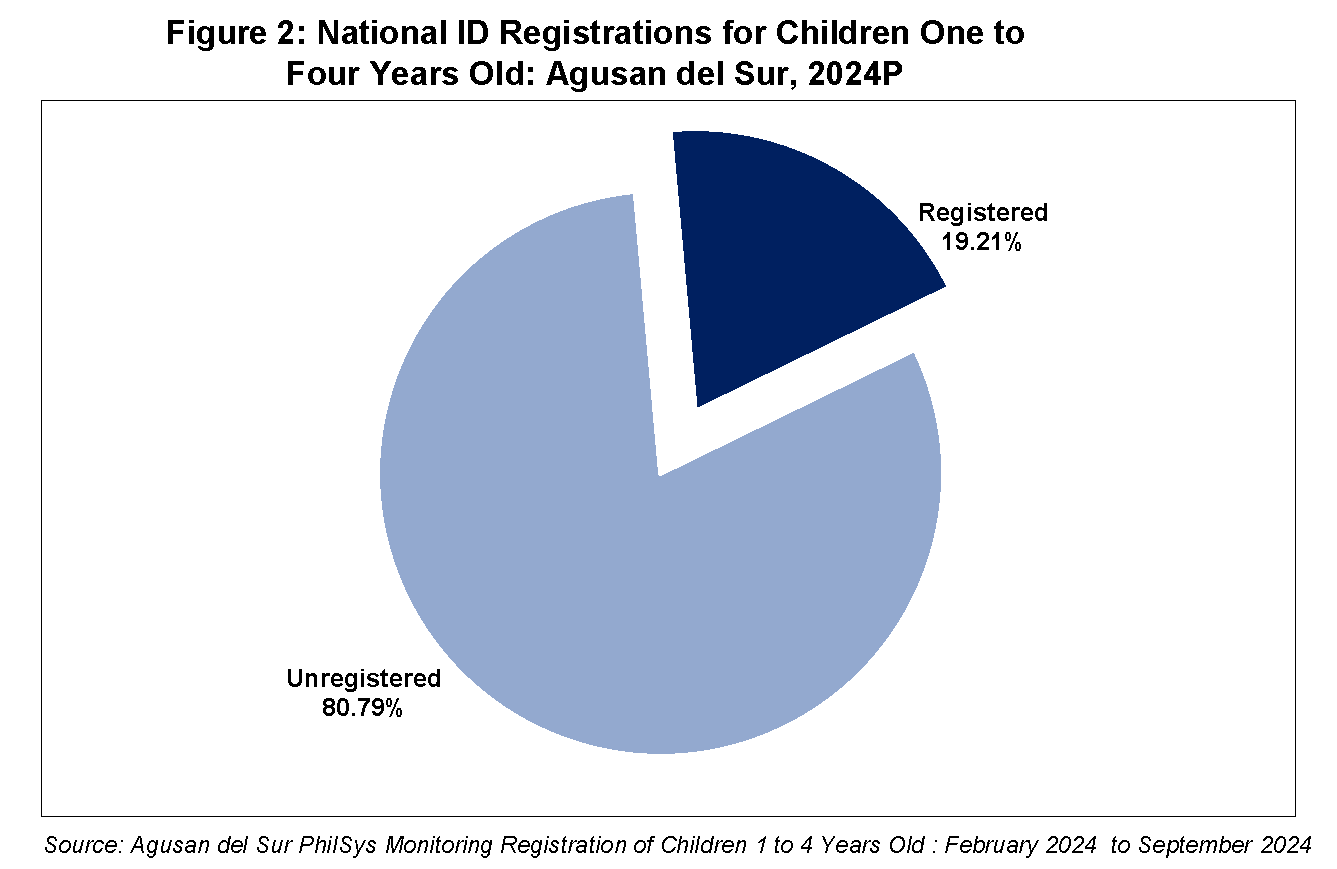
Male registrations fall by 40.68 percent , female by 22.60 percent
Furthermore, the PSO disaggregated the registration data by sex for both August and September. In August, 2,898 males were registered, alongside 2,084 females, contributing to a strong registration turnout for that month.
However, in September, the number of registered individuals saw a decrease, with only 1,719 males and 1,613 females recorded. This significant reduction in registrants translates to a 40.68 percent decline in male registrations and a 22.60 percent drop in female registrations. The total number of registrants decreased from 4,982 in August to 3,332 in September, marking a substantial 33.12 percent decline in overall registration turnout. This downward trend highlights the importance of ongoing outreach and mobilization efforts to boost registration rates in the coming months. (Figure 3)
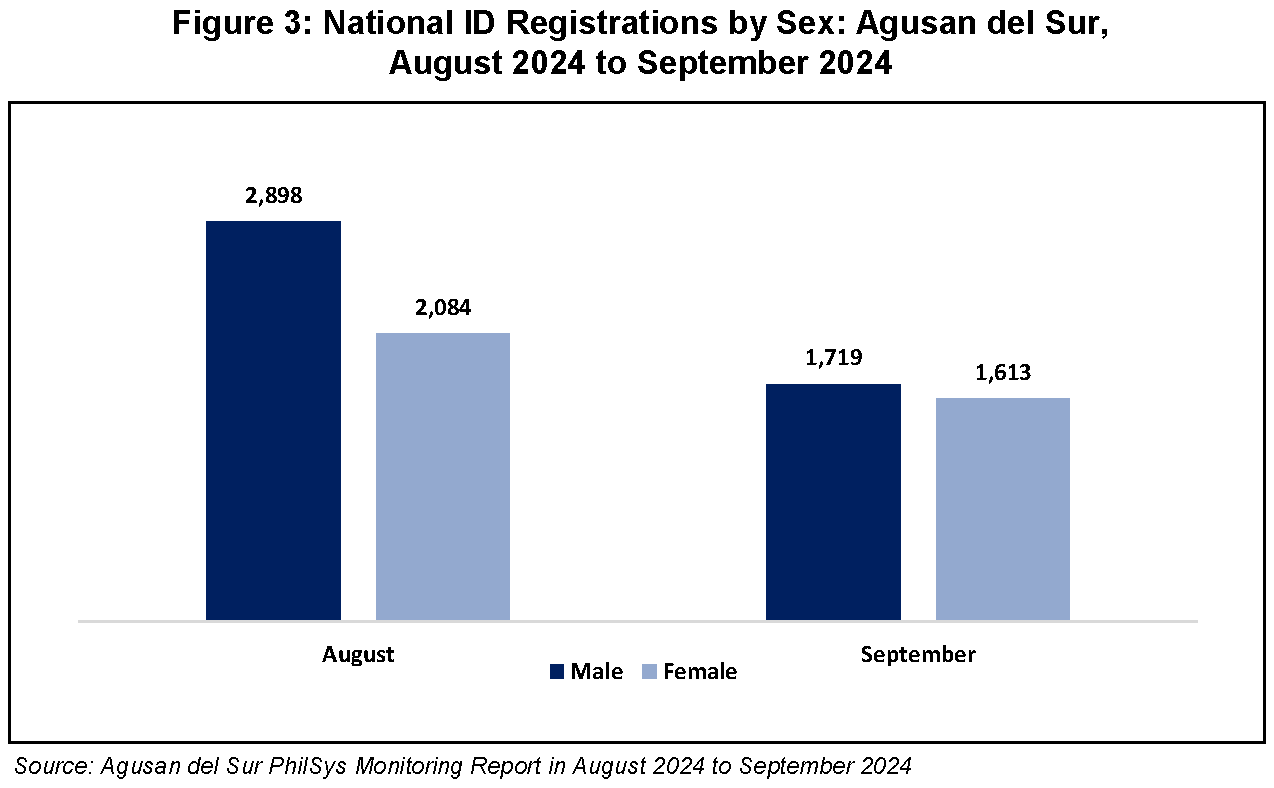
Fixed Registration Center (FRC) successfully assisted 130 clients obtain Digital National IDs, 17 fail after three attempts at
The FRC successfully assisted 130 clients in generating their Digital National IDs. Many of these clients needed the ID to fulfill requirements for late birth registration, while others used it to register their children under five years old. However, 17 clients assisted but were unable to generate their Digital National IDs after three attempts.
Over 418,000 ePhilIDs Issued in Agusan del Sur
The issuance of the PhilSys digital ID, also known as the ePhilID, is a proactive strategy by the Philippine Statistics Authority (PSA) that enables registrants to
immediately enjoy the benefits of being PhilSys registered. Since its launch in October 2022, a total of 418,711 ePhilIDs have been issued to registered individuals in Agusan del Sur. In 2022, there were 234,114 ePhilIDs issued, followed by 181,886 in 2023, with preliminary data indicating 2,711 issued as of September 2024. The ePhilID features the individual’s PhilSys Card Number (PCN) with basic demographic information, and includes a QR code for authentication. Notably, the ePhilID carries the same functionality and validity as the physical card. (Figure 4)
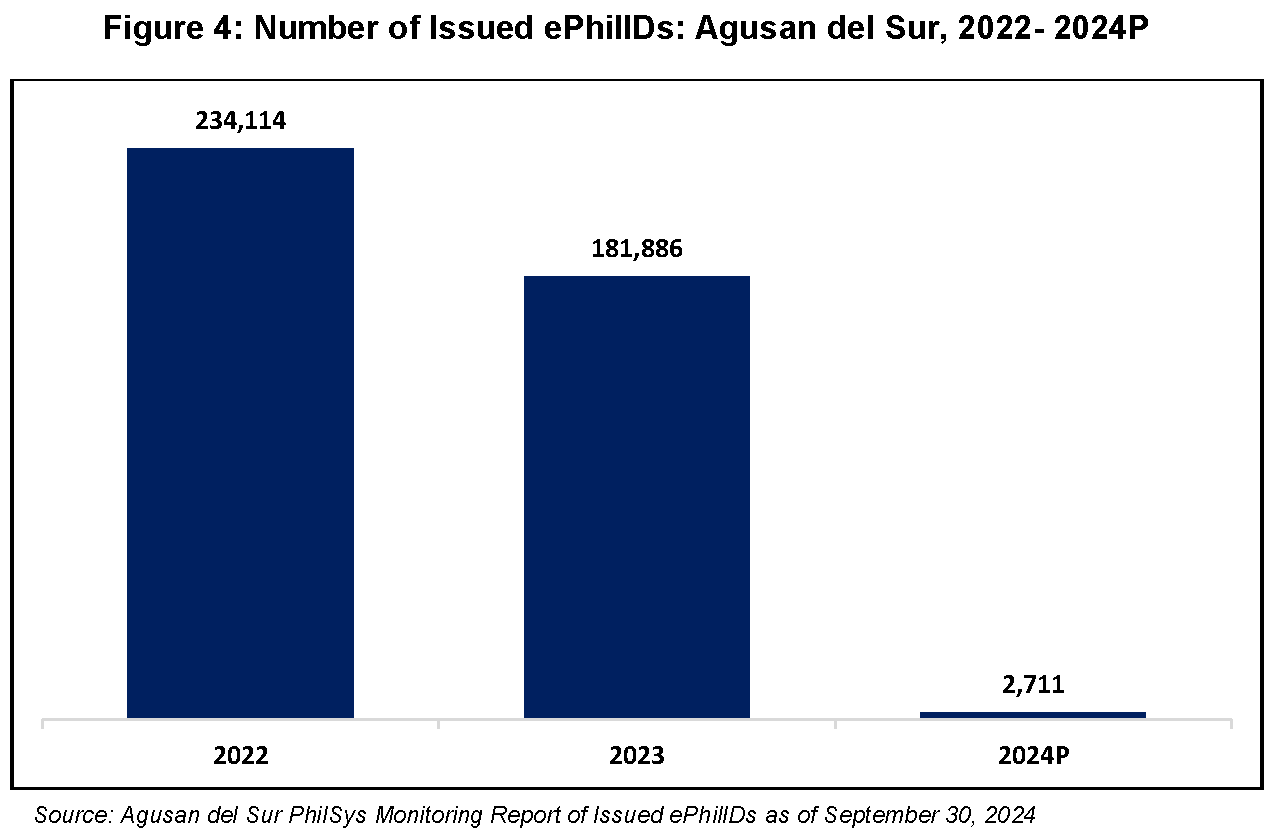
(Sgd.) DEMETRIO T. DEJOLDE, JR.
Chief Statistical Specialist
TECHNICAL NOTES
Philippine Identification System or PhilSys refers to the government’s central identification platform for all Filipino citizens and resident aliens of the Philippines.
Target Population is derived from the official release of PSA during the conduct of 2020 Census of Population and Housing (CPH).
PhilID refers to the physical ID card that serves as valid proof of identity for transactions with both the government and the private sector. This non-transferable card contains a registrant’s demographic and biometric information, including their full name, birth date, address, front-facing photograph, and the PhilSys Card Number (PCN). The PhilID is issued upon successful registration in the PhilSys.
ePhilID is the printed version of the PhilID and has the same functionality and validity as the physical card. It is a proactive strategy of the PSA that will allow more Filipinos to immediately enjoy the benefits of being PhilSys-registered.
Digital National ID is an electronic version of the PhilID that enables registered individuals to acquire their PhilID via mobile phones or laptops. It holds the same functionality and validity as the physical card.

